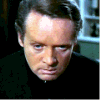Monday, June 16, 2014
King John
The prevailing view of Shakespeare's histories, somewhat oversimplified, is that nation-states are driven above all by strong personalities. King John, with its constantly shifting allegiances and treaties made and broken within hours, comes near to throwing out the nations entirely. The play, set long before any of the other histories, begins on a strange note: France and its king threatens England with war not for the sake of conquest, but ostensibly to restore the rightful ruler Arthur, young son of John's older brother. The armies meet before the city of Angiers, whose citizens, in the play's funniest line, promise allegiance to the "King of England," leaving it to the combatants outside to decide who that will be.
Putting the word 'king' in quotes seems apropos, since as John himself admits, what makes the king is the crown. Arthur may have the right of blood, but that doesn't seem to count for much in this era. France will soon abandon him for a marriage treaty with England, which will itself be almost immediately broken due to a bit of mischief caused by the pope's emissary.
Overall, King's John is a play without much of a center, where the facts seem to matter little in the face of passion and whim. After Arthur is captured on the battlefield, John, despite an assured victory over France, orders his death out of cowardice. And even though his assassin can't bear to do it - for some reason, the death was to be "facilitated" by burning the boy's eyes out, which would make Voldemort hesitate - Arthur kills himself in a desperate escape attempt, and John take the blame. This causes England's nobility to take up France's cause (although not for long). There is no simple war between nations in this play.
Most of the play's critics think the best thing about King John is Faulconbridge, bastard son of Richard the Lionheart, common man turned knight. Certainly he's extremely witty, and something of a predecessor to Falstaff, or even Hamlet. But I have a hard time figuring him out. In the first act, after he's first acknowledged by John and given a title, he gives a wonderful monologue wherein he promsies to deliver "sweet, sweet, sweet poison for the age's tooth / which, though I will not practice to deceive / yet, to avoid deceit, I mean to learn". I find this highly ambiguous, because throughout the rest of the play, Faulconbridge exhibits nothing but honor, loyalty, and bravery, despite his brash and sarcastic mannerisms. Despite all the play's twists and turns, he manages to keep his head on straight.
So what are we to make of this monologue? I like to believe that Faulconbridge has a strong streak of self-interest, and considering that he ends the play as England's foremost military commander and supporter of the young Prince Henry, then it must have served him pretty well. Very interesting character.
Subscribe to:
Post Comments (Atom)


No comments:
Post a Comment